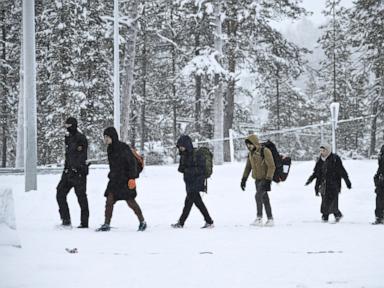HELSINKI — Following Finland’s induction into NATO earlier this annum, Moscow vowed retribution.
Suddenly, a multitude of migrants hailing from the Middle East and Africa have congregated at Finland’s periphery with Russia, wishing to penetrate the Scandinavian nation.
Finnish representatives assert the abrupt increase in refugee claims is not happenstance. They charge Moscow with propelling these individuals to the frontier as retribution for Finland joining NATO.
This account sheds light on the migratory predicament unfolding at segments of Finland’s 830-mile (1,340-kilometer) demarcation with Russia.
WHAT TRANSPIRED?
A constant, albeit slight flow of refugee claimants has historically reached Finland’s border inspections, given its status as the European Union’s frontier state to the east. Nevertheless, there has been a recent and significant spike.
Per official tallies, upwards of 900 migrants have approached Finland since August, with over 800 in November alone.
Finnish officials disclose that these individuals originate from nations such as Syria, Yemen, Somalia, Iraq and Afghanistan, and highlight that, in contrast to bygone times, the Russian officials have permitted their passage notwithstanding their absence of proper credentials.
Enduring Finland’s brutal winter climate, most arrive clad in trainers and mounted on bicycles.
“Evidence at our disposal now demonstrates that Russian border forces are not only allowing those lacking the necessary papers to approach the Finnish border but are also actively facilitating their journey to the border area,” Finnish Foreign Minister Elina Valtonen relayed to The Associated Press on Wednesday.
FINLAND’S RESPONSE
The Finnish government promptly shut down four border posts and subsequently a further three, retaining merely one Arctic entry point for refugees. Finnish troops were deployed to raise barbed wire and concrete obstructions along the boundary.
Finland also sought assistance from the EU border entity Frontex, which consented to dispatch a contingent of agents and gear in support to the Finnish frontier. Prime Minister Petteri Orpo has acknowledged a “grave breach of border safeguarding,” though the authorities also maintain that the situation is firmly in hand.
The Kremlin repudiates any involvement in the encouragement of the migrants and expresses regret concerning the Finnish border restrictions. Russian Foreign Ministry spokeswoman Maria Zakharova suggested on Wednesday that rather than closing its borders, Helsinki should have endeavored “to find a reciprocally agreeable resolution or elucidate.”
HYBRID HOSTILITIES
For several years, Western territories have indicted Russia and its confederate Belarus of manipulating migrants striving for sanctuary and economic prospects in Europe as instruments to unbalance Western nations. European heads deemed it a kind of “hybrid warfare” employed against them, analogous to disinformation, elections meddling and cyber incursions.
Finnish Foreign Minister Valtonen, speaking to the AP, affirmed without hesitation that Russia “is deploying migrants” to its advantage in a “hybrid confrontation” against Finland, which is a repercussion of the country’s decision to join NATO — a choice incited by Moscow’s absolute incursion of Ukraine.
Other analysts from the West concur.
“The Finns are undeniably correct that the Russians have capitalized on migration for a while, in tandem with virulent misinformation campaigns — their objective being simply to foster ‘divides’ within communities they perceive as antagonistic,” expressed Klaus Dodds, a geopolitical academic at Royal Holloway, University of London.
“This is all aimed at destabilizing Finland,” he concluded.
A SENSE OF FAMILIARITY
European Union Home Affairs Commissioner Ylva Johansson acknowledged this week that the events at Finland’s frontier evoke a sense of “deja vu.”
This week, Finnish President Sauli Niinistö recollected that throughout the years 2015 and 2016, Russia had allowed refugees to draw near checkpoints in Finland’s northern sector. This was perceived to be a reprisal for Finland magnifying its NATO training endeavors.
He reminisced about premonitions that Finland should brace for a “certain malevolence” from Moscow and remarked that “our present daily reality serves as a reminder of Finland’s NATO accession.”
For over two years, NATO states Poland, Lithuania, and Latvia have all encountered migratory strain at their frontiers with Belarus — Russia’s ally.
A negligible stream, followed by an unexpected climb of migrants from Belarus, transpired after the EU inflicted sanctions on Belarus for a 2020 election which the autocratic leader Alexander Lukashenko declared victorious but was globally denounced as fraudulent.
Whilst visiting Finland this week, Latvian Prime Minister Evika Siliņa articulated to the AP that there had been an escalated frequency of migrant attempts to traverse the Belarus-Latvia border in September, compelling them to shut all checkpoints along the 107-mile (173-kilometer) border, save for one reserved for refugee claimants.
Siliņa professed the impossibility of discerning the intentions of Lukashenko and Vladimir Putin.
“That’s what’s distressing,” she admitted. “We lack the ability to foresee it. We must react and adopt a proactive stance akin to an urgent scenario.”
MIGRATION STRAIN AND INSTABILITY
Migratory pressure compels democracies to forsake their pledge to grant asylum seekers the chance to seek refuge, thus manifesting the frailties within democratic frameworks.
For many years, Europe has been grappling with intense migratory strains, sparking a reaction in numerous locales against immigrants and bolstering far-right factions.
A recent instance emerged in the Netherlands, where anti-Islamist politician Geert Wilders achieved an electoral triumph this week.
In Poland, the border situation intensified existing societal rifts, pitting those in support of a stringent stance on immigration against advocates of a more welcoming policy towards migrants and refugees. The government lambasted those sympathetic towards migrants as unknowingly aiding adversarial foreign entities.
New barriers and ramparts have emerged across Europe as a result of migration and Russian aggression. Yet, they are not wholly effective.
The Polish Border Guard has recorded 25,500 instances this year of illicit ingress through the border from Belarus, despite the construction of a considerable steel barrier last year.
DEBATES WITHIN FINLAND AND ARCTIC CROSSINGS
Finns are currently engrossed in discussions over whether the imperative of national security — a paramount concern for any administration within this nation of 5.6 million proximate to Russia — takes precedence over human rights issues.
Pursuant to international accords and conventions esteemed within Nordic countries, at least one entryway on a nation’s borders is required to remain available for refugees.
Orpo’s cabinet opted to adhere to this by preserving the Raja-Jooseppi border post in the far northern Arctic. It is the utmost northern checkpoint between Finland and Russia, nestled within the wilderness of the Lapland area, approximately 155 miles (250 kilometers) from Russia’s northern metropolis of Murmansk.
Despite its seclusion, about 55 migrants appeared at the checkpoint on Saturday, a number surpassing the norm.
___
Vanessa Gera provided this report from Warsaw, Poland.
___
Monitor AP’s reportage on migration disputes at https://apnews.com/hub/migration







